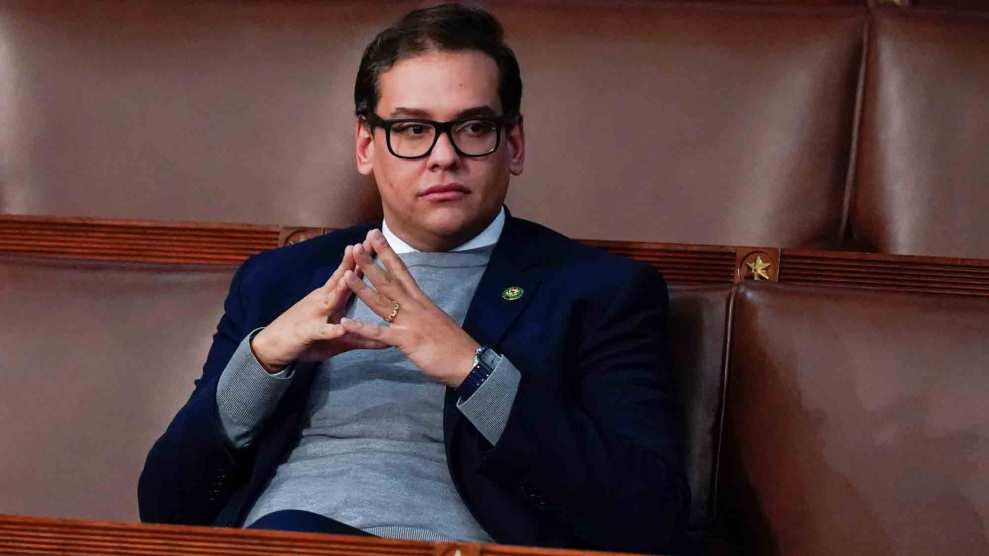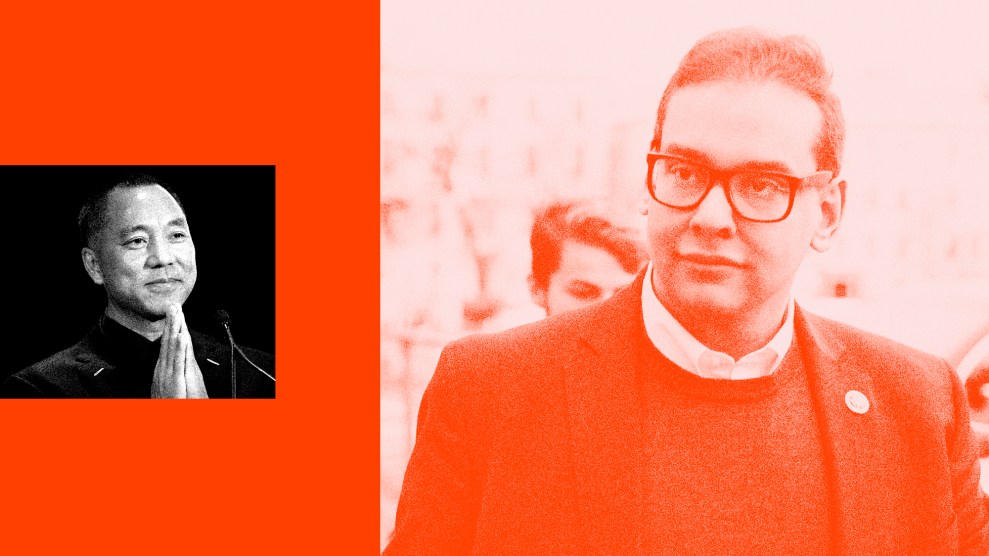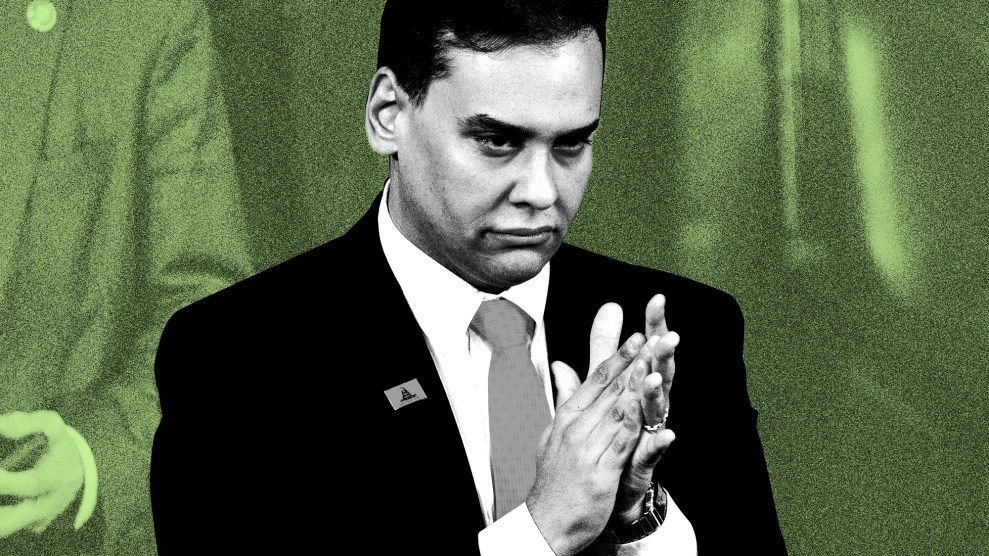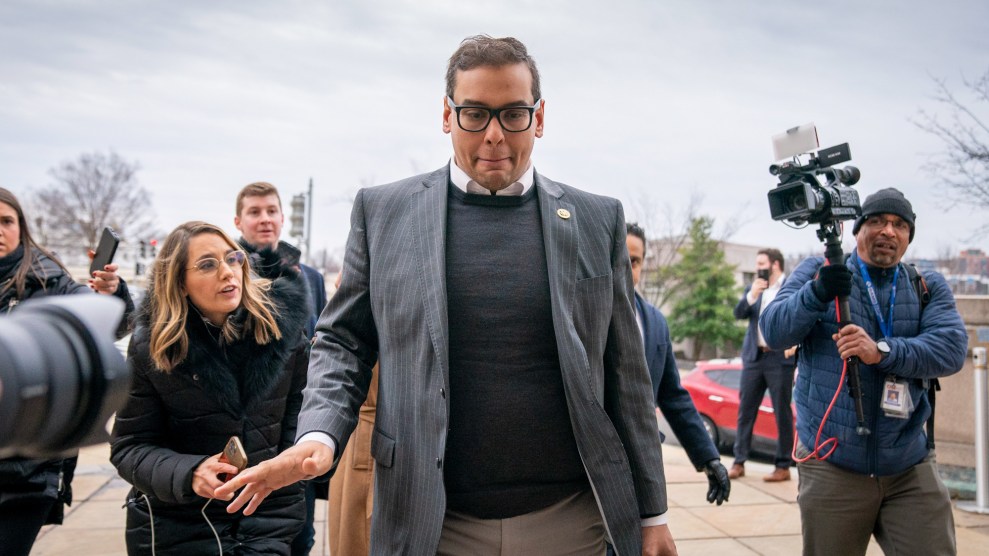
AP/Alex Brandon
Thirteen criminal counts later, there’s still a lot we don’t know about George Santos. Where did the more than $700,000 he loaned his most recent campaign come from? Were some of the top donors to his 2020 congressional bid as fake as his volleyball career? Did Santos’ campaign treasurer know about his many schemes? These are some of the questions that aren’t answered by the indictment unsealed on Wednesday.
But federal prosecutors have already revealed more than enough to potentially send Santos to prison. He is now in custody at the federal courthouse in Central Islip, New York, and is expected to be arraigned this afternoon. The Justice Department has said that the top counts on the indictment carry a maximum sentence of 20 years.
The indictment can be divided into three sections. The first focuses on how Santos allegedly conned donors into giving money to a company he claimed was a super PAC supporting his campaign. That was not at all true, the indictment states. Santos allegedly pocketed the donations then used the money to buy luxury goods, make car payments, and pay off personal debts. The potential contours of this scheme were first revealed in a January report from the New York Times.
The second section focuses on previously unknown unemployment insurance fraud. In 2020 and 2021, Santos worked as a regional director at Harbor City Capital, an investment firm that was shut down by the SEC for allegedly running a $17 million Ponzi scheme. According to the Justice Department, Santos received more than $24,000 of pandemic-era unemployment insurance between June 2020 and April 2021 after falsely claiming to be unemployed. The indictment states that he was making about $120,000 per year at the time while working at “Investment Firm #1,” an apparent reference to Harbor City.
The final part of the indictment focuses on false statements Santos allegedly made in his 2020 and 2022 congressional financial disclosures. In 2020, Santos allegedly failed to report income from Harbor City, while overstating the money he earned from a different company. In a September 2022 disclosure, Santos reported earning $750,000 in salary, along with between $1 million and $5 million in dividends from the Devolder Organization, a company he controlled. Santos also reported having between $1 million and $5 million in a savings account. The claims about this suddenly acquired wealth were not true, according to the indictment.
This is where it gets murky. The Justice Department has not said how much in cash and assets Santos really had. Did Santos own a home in Rio de Janeiro worth up to $1 million, as he claimed in the 2022 disclosure? Did he make anywhere close to the amount that would have been needed to loan more than $700,000 to his 2022 campaign? If not, where did the money for the loans come from? How did he convince the cousin of a Russian oligarch to become one of his biggest financial backers? The indictment does not say.
In January, we reported that more than a dozen of the biggest donors to Santos’ 2020 campaign do not appear to exist. Some had names shared by nobody in the United States, according to public records. Others lived at fake addresses. In a follow up story, we reported that at least one of Santos’ relatives did not make the $5,800 donation attributed to them. These are all potential crimes that have yet to be addressed.
A name that is conspicuously absent from Wednesday’s indictment is Nancy Marks, Santos’ campaign treasurer in 2020 and 2022. As the treasurer, she likely knows more than anyone other than Santos about potential campaign finance law violations. As Mother Jones has reported, Marks also had an unusual business arraignment with Santos through a campaign consulting company called Red Strategies USA. It’s not clear from the indictment what, if anything, Marks may have told federal investigators.
Marks signed off on many hard-to-believe transactions, including a series of $199.99 expenses just below the federal threshold required for maintaining records to verify the spending. She also claimed in FEC reports that her family members gave Santos more than $30,000 during the 2022 campaign. That included her two children, who were 19- and 22-years-old at the time, each giving Santos the legal maximum of $5,800. “It is awfully hard to believe that whoever compiled and formally submitted Santos’ FEC reports believed that they were true,” Adav Noti, senior vice president and legal director at the Campaign Legal Center, told Mother Jones in January. “They are just, on their face, obviously false.”
These potential misrepresentations could pose legal problems for Marks. But like so much of the Santos story, prosecutors have left her out. At least for now.














